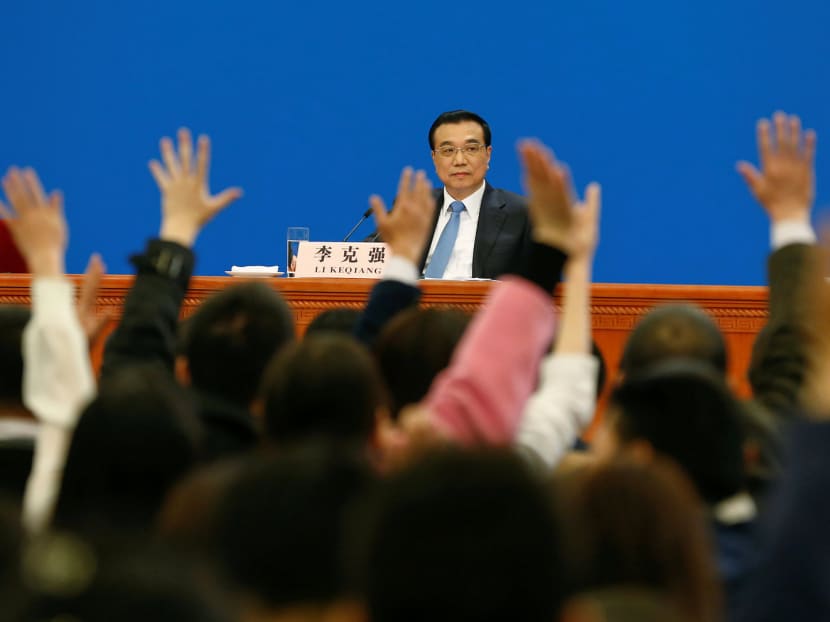China to fasten seat belt, rein in risks: Premier Li
BEIJING — China’s Premier Li Keqiang reassured investors yesterday that the world’s second-largest economy is strong and not at risk of a hard landing.

Premier Li Keqiang taking questions at his annual news conference after the closing ceremony of China’s National People’s Congress in Beijing, yesterday. He said that talk of a sharp slowdown in China’s economy should stop. PHOTO: REUTERS
BEIJING — China’s Premier Li Keqiang reassured investors yesterday that the world’s second-largest economy is strong and not at risk of a hard landing.
Speaking at his one news conference of the year following the close of the annual National People’s Congress, Mr Li acknowledged that there are internal and external risks to China’s economy, but added that talk of a sharp slowdown should stop.
“Almost every year I have heard a prediction of the Chinese economy having a hard landing,” Mr Li said at the highly staged event, where journalists are pre-selected to ask questions. “But I believe that our economic performance in the past several years ... should suffice to put a full stop to such prophesies of a hard landing.”
While many analysts doubt the strength and consistency of Chinese official data, even some veteran China sceptics agree that economic activity did pick up last year, buoyed by heavy government stimulus in the form of record bank lending and billions in government infrastructure spending, as well as a speculative housing boom.
The economy ultimately grew 6.7 per cent last year. China has cut its economic growth target this year to around 6.5 per cent from its 2016 goal of 6.5 to 7 per cent, while vowing to push through reforms to tackle rising debt and guard against financial risks.
“As for the projected target of GDP (gross domestic product) growth this year at about 6.5 per cent, I have read some foreign media describing it as a move by the Chinese government for moderate downward adjustment of GDP growth,” Mr Li said. “I should point out that 6.5 per cent growth is not low-speed and will not be easy for us to meet.”
Data in recent weeks have shown the economy started strongly in 2017, though growth appears to still be heavily dependent on credit, infrastructure investment and the property market. Private investment also rebounded over the first two months, which the authorities attributed to a better economic environment compared to a year ago and policy support.
Analysts say China’s continued reliance on credit-fuelled growth and rising debt increases the risk of a financial crisis ahead. Many believe a massive bank bailout may be inevitable.
China will fasten its “seat belt” and rein in risks as it pursues mid- to high-speed growth, Mr Li said, adding that the government has enough policy tools to handle any risks.
“We need to take very seriously the risks we are facing on the domestic front, especially in the financial sector ... We will take prompt and targeted measures to prevent them from further spreading,” Mr Li said.
“China’s financial system is generally stable and there are no systemic risks. We still have a good reserve of policy options and instruments at our disposal.”
He added that the labour market faces “relatively large” employment pressure this year with a record 7.95 million college graduates and another five million graduating from secondary vocational schools.
With “several hundred thousand” workers losing jobs amid the drive to cut excess capacity, the government’s job is to ensure ample opportunities and it will not allow massive unemployment in a particular group of people, Mr Li said.
Mr Raymond Yeung, chief greater China economist at Australia & New Zealand Banking Group in Hong Kong added: “Containing unemployment pressure is critical.”
China stocks ended little changed yesterday as investors remained cautious ahead of an expected United States interest rate hike later in the day.
Traders said there were few surprises from Mr Li’s news conference.
The blue-chip CSI300 index rose 0.2 per cent to 3,463.64 points, while the Shanghai Composite Index added 0.1 per cent to 3,241.76 points.
“China’s economy had a pretty good performance in January and February. March data will be crucial as investors are anxious for any hint on whether the recovery is sustainable,” said Mr Linus Yip, strategist at First Shanghai Securities. AGENCIES





